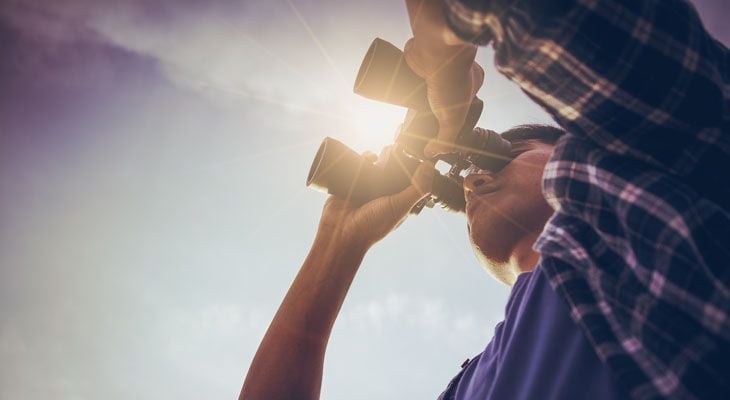
The human visual system is a complex network including the eye, ocular nerves, and key brain areas that process visual information. Under most circumstances, we use information from both eyes to create a single visual image. This ability to converge information from both eyes is called binocular vision. In some cases, the eyes fail to seamlessly meld visual information into a coherent image. An eye care provider can assess vision to determine if there are problems with binocular vision that require further care.
How Does Binocular Vision Work?
Unlike some other animals, humans’ eyes are both set on the front of the face, permitting binocular vision. Each eye has a field of view, which is the area that you can see when you close one eye. The center of the eyes’ fields of view overlap with one another, although visual information in the periphery can only be detected by one eye. This information is transmitted to an area of the brain in the back of the head, which synthesizes the overlapping visual information to make a single coordinated image.
Binocular Vision and Depth Perception
One of the reasons that binocular vision is so important is that it allows us to perceive depth and relationships between objects. Each eye sees slightly different spatial information and transmits these differences to the brain. The brain then uses the discrepancies between the two eyes to judge distance and depth. The result is the ability to see a 3-D image and distinguish the relationships between objects. Depth perception is technically called stereopsis or stereoscopic vision.
Causes of Binocular Vision Problems
If the eyes can no longer maintain their correct position or focus on the same object, the result is problems with binocular vision. In cases of strabismus, or cross-eye, the eyes are not properly aligned, with one is drifting from its normal position. Strabismus causes the brain to have difficulty synthesizing visual images from each eye, resulting in impaired binocular vision and depth perception. Amblyopia, or lazy eye, is another condition that causes binocular vision problems. Amblyopia occurs when the brain ignores input from one eye, affecting depth perception and other visual abilities.
Fortunately, most problems with binocular vision are easily treated through eyeglasses, vision therapy, or surgery. Receiving a thorough annual optometry exam -- especially during childhood when the visual system continues to develop -- is essential to detect these eye problems. Your eye care provider can recommend treatment options that correct or manage problems with binocular vision.
